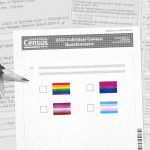Millions of LGBTQ+ people who have so far been invisible in the American Community Survey, the largest household survey in the country, may soon be recognized.
The U.S. Census Bureau on Tuesday published its plan to test questions about sexual orientation and gender identity in the American Community Survey (ACS) next year. The ACS is a crucial resource to understand daily life for Americans, as it gathers data about social and economic needs not covered in the decennial census — information on internet access, transportation, employment, education, and more.
Within that snapshot of American life, LGBTQ+ people have not been counted as themselves.
In a report released this spring, the Brookings Institution estimates that up to 17.3 million adults who identify as LGBT are not identified in the ACS, with the largest gap among young adults, who are more likely to be openly LGBTQ+ than older generations.
The ACS has not collected any data on sexual orientation but has only been able to identify same-sex couples who live in the same household. This limitation on the survey’s data has skewed results by overstating the economic well-being of LGBTQ+ people, Brookings found, since cohabitating couples tend to be older and more well off.
Having accurate data about LGBTQ+ Americans’ economic situation matters because, as advocates have repeatedly said, without that data, it is harder to push for LGBTQ-inclusive policies and government funding to actually address those inequalities.
The Census Bureau’s proposal to gather sexual orientation and gender identity within the ACS is the latest step in a years-long push to improve national data on LGBTQ+ people. In 2021, the Census’ Household Pulse Survey — launched to measure effects of the pandemic — became the first time that the agency captured data on LGBTQ+ Americans beyond simply counting same-sex couples.
The Justice Department asked the Census Bureau last year to include questions on sexual orientation and gender identity in the ACS, NPR reports, citing a working paper from a bureau official. Within its proposal published Tuesday, the bureau notes that federal agencies are interested in data on Americans’ LGBTQ+ status for “civil rights and equal employment enforcement.”
The 2023 budget for the Census Bureau also included a request for $10 million from Congress to study the best ways to format questions on sexual orientation and gender identity.
The test ACS will ask respondents to first identify their sex assigned at birth, then their current gender. The options for current gender — which will be asked for only those who are 15 and older — are male, female, transgender, nonbinary, and a fill-in-the-blank space. The bureau plans to compare results when respondents are allowed to choose only one option for their current gender, versus multiple options.
People 15 and up will also be asked if they think of themselves as gay or lesbian, straight, bisexual, or a fill-in-the-blank space.
The Census Bureau estimates that roughly 271,000 houses, part of a nationally representative sample, will respond to the ACS test. That sample will be taken from houses that are not taking the regular survey next year. Right now, the agency is taking public comments on its test plan until late November.
The Biden administration has tasked other federal agencies to plan how they can use enhanced data collection to advance equity for LGBTQ+ people, and in January, the White House released a detailed report on LGBTQ+ data needs and guidelines for collecting that data.
That White House report points out that although updating the ACS with LGBTQ+ information is important, large demographic surveys are not the only area that needs to be changed. LGBTQ+ people also need to be better counted in administrative data, like health registries, and the federal government needs to gather more information on what kinds of disparities the LGBTQ+ community faces.







